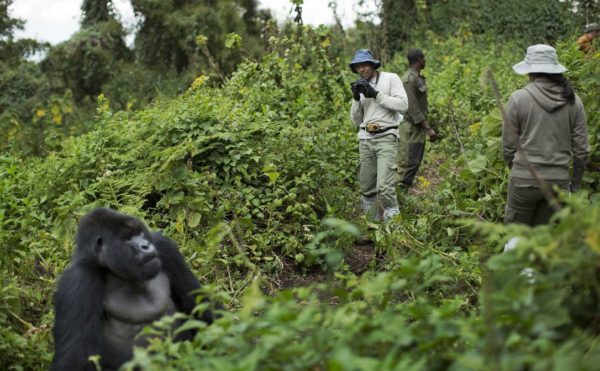When the change in gorilla permit fees was announced on 6, May 2017, RDB stated that tourists who, in addition to gorilla trekking, also visited either Nyungwe National Park and Akagera National Park for a minimum of three days during the low season(November-May) would receive a discount of 30%. This was in addition to a 15% discount for conference tourists who stayed pre-or post-conference dates to see gorillas.
AP wrongfully states that ’fees have been reduced by 30 per cent for the low season in the hope that visitors will return.
The AP report further states that ‘Following the drop in tourist numbers, Volcanoes National Park decided to reduce the fee from November to May to $1,050’.
The discounts that RDB announced in 2017 were part of our strategy to encourage visits to Akagera National Park and Nyungwe National Park as well as encourage conference guests to visit the gorillas.
The discounts were not in reaction to reduced visitor numbers to Volcanoes National Park.
Furthermore, AP states that ‘Since then the Rwanda Development Board has lost business to Uganda, leaving many guides and others in the hospitality industry without income, according to the park authority’s website’.
We would like to state unequivocally that RDB has never stated, in any forum, that guides and others in the hospitality industry are left without income due to an increase in the gorilla permits. That is erroneous.
In terms of sales of gorilla permits, what we are seeing is an unsurprising market reaction. There was increased revenues immediately after the announcement in 2017 which led to a 4% increase of revenues in 2017 compared with 2016. However, there was a small decrease during the low season but we are seeing a recovery again in the high season. This is because our visitors understand that the price increase was made in order to ensure gorilla conservation and improve the overall gorilla trekking experience. Between May- August 2018, RDB saw increased revenues of USD $983,333 when
compared to the same period in 2017. We are confident this trend will continue.
Gorilla trekking is a highly unique experience. Rwanda increased the gorilla permit fees in order to ensure sustainability of conservation initiatives, enhance visitors’ experience and improve the lives of the communities living adjacent to the national parks. These objectives informed our decision for a high-value, low – volume market segmentation. This implies that facilities have to be competitive to serve this clientele, and those that aren’t may lose business to more competitive ones.
Tourism has played a major role in improving the lives of Rwandans. One of the major tourism initiatives was the Revenue Share Program. Initiated in 2005 by the Government of Rwanda, the Revenue Share program aims to guide investment in the areas surrounding the various national parks in Rwanda by ensuring that 10% of all park revenues are shared with the communities living in those areas. Due to the program, communities have been able to access clean drinking water, health centers, classrooms and decent housing.



